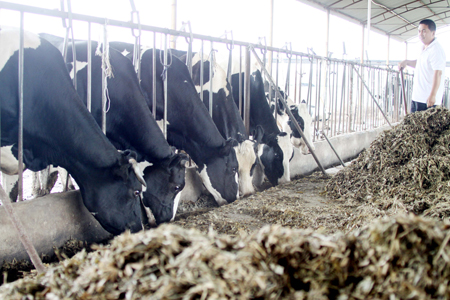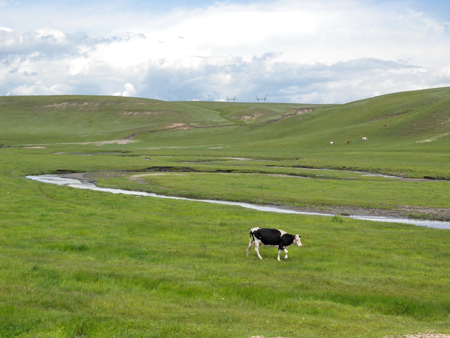Economy
Cold comfort for farmers as milk sours
By Wei Tian (China Daily)
Updated: 2011-07-06 09:43
 |
Large Medium Small |
|
 |
|
A farmer feeds cows in Qingbao village in Baoding, Hebei province. Amid rising costs, unpredictable outbreaks of disease and industrial scandals, many farmers, including those in the village, have considered quitting the industry and seeking other jobs. [Photo / China Daily] |
|
 |
|
A dairy meadow in the Inner Mongolia autonomous region, a major milk-producing area in China. [Photo / China Daily] |
The dairy industry faces more upheaval, reports Wei Tian from Hebei province.
"If you hate someone, send him to breed cows" is now a black joke widespread among Qiao Dongming and his fellow dairy farmers at Wangshengtan, a livestock base in Hebei province, 160 kilometers from Beijing.
|
||||
If things go well, Qiao, who owns more than 100 cows, can make between 8,000 ($1,240) and 10,000 yuan month, more than most white-collar workers make in China's capital city. In terms of asset value, Qiao's 100 cows, costing 10,000 yuan each, make him a millionaire.
With flexible working hours and seemingly decent pay, many would view his Arcadian life as a dream job. However, Qiao himself would absolutely disagree.
Rise of controversy
The current standard of Chinese dairy products was recently denounced as the "worst in the world" by Wang Dingmian, the chairman of the Guangzhou Dairy Association, because of the low protein content and high levels of bacteria allowed by the official regulations.
Wang's comments came under fire from Nadamude, the secretary-general of the Dairy Association of the Inner Mongolia autonomous region, who claimed that if the standards of dairy products are raised, the resultant rise in costs would mean that 70 percent of dairy farmers would have to sell their cows.
The debate is again arousing nationwide discussion on whether or not to improve the criteria. But for Qiao, this will soon be none of his business, as he is planning to sell his cows, and quit the job he has held for more than four years.
"Actually I have never made a profit in recent years," Qiao said.
"The sum of 10,000 yuan a month may seem like quite an decent amount, but it's nothing compared with what I've lost during the past few years," he said.
The 34-year-old entered the dairy industry in 2007, and has experienced nearly all of the major "turbulence" in the industry since then, including the 2008 scandal - when milk tainted with melamine entered the food chain - and the spread of foot-and-mouth disease in 2009.
When the melamine scandal broke, all milk collection was suspended overnight, Qiao said. With demand dropping sharply, he had to dispose of tens of thousands of liters of milk.
During the foot-and-mouth outbreak, nearly half of the herd at Wangshengtan farm was affected, leading to the deaths of more than 40 of Qiao's cows. Some farmers managed to sell their non-infected cows at a "beef" price, which is lower than they'd fetch as livestock. Others had to watch the dead cows piling up, Qiao remembered.
Even during "peacetime", Qiao has to be vigilant to prevent his cows from contracting Bovine Mastitis, which is a common disease in the herd.
"Once a cow is infected, its milk cannot be approved for collection for at least a year, and the cows become a pure waste of money," Qiao said, explaining that even under normal circumstances only 30 to 40 of his 100 cows actually produce milk, when calves and those suffering from mastitis are taken into account.
"I now understand why old people say 'better to grow crops with roots than to breed cattle with mouths'," said Qiao. "Cattle-breeding is just too risky a business.
"After all we've been through over the years, any dairy farmer who has persisted until now should be regarded as a hero of the industry," Qiao said.
But Qiao and other dairy farmers weren't tricked into joining the cattle-raising business, neither are they doing it to be heroic. There was once a time when breeding cows was a truly rewarding job.
| 分享按鈕 |



